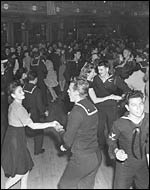|
Daily
Life

Letter writing was very important during the war for keeping up
morale. Photo Credit: Getty Images. |
Even though
there was a war going on, life went on. I continued to go to school
and spend time with my friends. Still, some things were different.
Because gas was rationed, it was hard to get around, and it was
hard to have fun. But we could go to the movies by bus, and there
were various high-school activities too. Mostly, we had fun through
church activities like picnics.
One of the ways
I spent my time was in writing letters. My boyfriend was a few years
older than I, and had joined the Air Force in 1943 to become a bomber
pilot fighting over Europe. We got engaged by the time I was 18
years old — it was what you did in those days.
I wrote him
plenty of letters to keep up his morale.
Keeping up the morale of our fighting men was important to everyone
those days. I not only wrote my fiancÚ, but to other men who were
overseas. Some of these men I had never met, but I would write them
because someone would pass me their names and tell me that they
did not get much mail. For those of us on the home front, we knew
how important it was to get mail when you are far from home, so
I made sure I wrote a lot.

With so many of their classmates already in the armed forces, Betty's
prom probably looked similar to this dance. Notice all the men in
uniform. Photo Credit: Corbis Images. |
We were able
to have our high school prom only because blackout shades had been
installed in our gym. If we did not have the blackout shades, the
lights from the gym could have been a target for enemy planes. My
two girlfriends and I were worried we would not be able to go. All
of the young men in our class were already in basic training or
overseas, and my boyfriend was overseas, and in those days, you
could not go to your prom without a date. Luckily, we met three
sailors who escorted us. I still wonder if they stayed alive to
the end of the war.
Think About
It
In the 1940s, it took about four to six weeks for a letter to get
from America to Europe by boat, and international phone calls were
very expensive. Think about how fast and cheap emails are in comparison.
Find Out
More
Read real letters written between Private
Art Pranger and his family during World War II.

|

